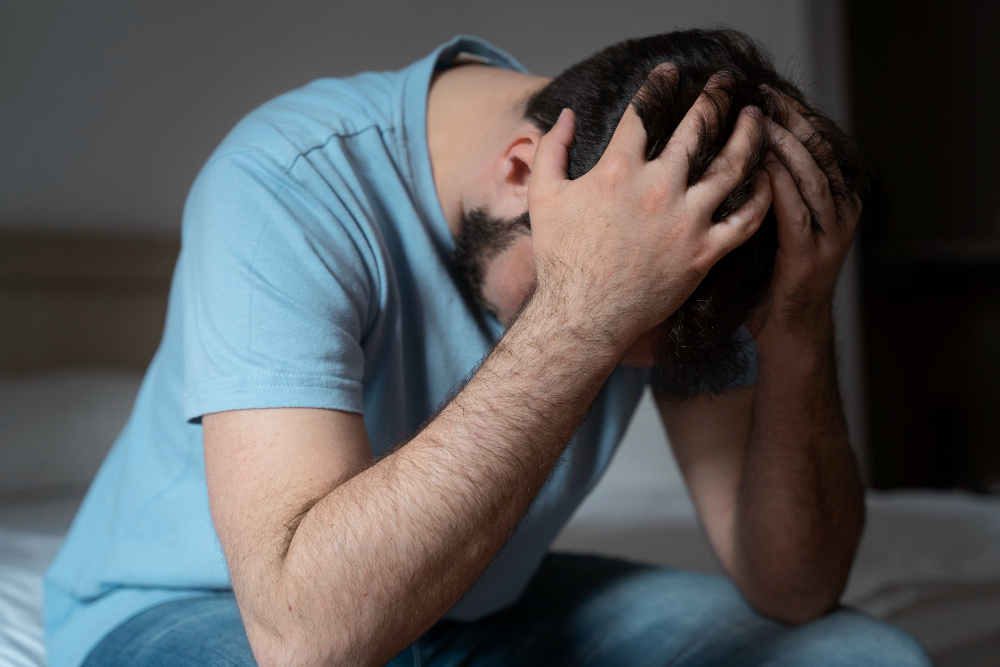Introduction:
In today’s fast-paced world, anxiety has become a common challenge for people of all ages. It can show up as constant worrying, a racing heart, restlessness, or even difficulty focusing. While medication is an option, many prefer to explore natural remedies that support mental health without side effects. Thankfully, there are proven lifestyle strategies that can reduce stress and bring a sense of calm. Let’s explore five natural ways to manage anxiety effectively.
1. Practice Deep Breathing Exercises
When anxiety strikes, our breathing tends to become shallow and rapid, which further signals the brain that something is wrong. Deep breathing reverses this pattern by activating the parasympathetic nervous system—the body’s natural relaxation switch.
👉 Try this: The 4-7-8 technique – Inhale deeply through your nose for 4 seconds, hold your breath for 7 seconds, and exhale slowly through your mouth for 8 seconds. Repeat this cycle 3–4 times. Within minutes, you may notice your mind slowing down and your body feeling calmer.
2. Stay Physically Active
Exercise isn’t just about staying fit—it’s a powerful anxiety reliever. When you move your body, it releases endorphins (happy hormones) and reduces stress chemicals like cortisol. Regular activity also improves sleep, which is directly linked to lower anxiety.
Simple options include:
-
A 30-minute brisk walk in the morning
-
Yoga sessions focusing on stretching and mindful breathing
-
Dance or aerobics to combine fun with fitness
Studies show that people who exercise at least 3–4 times a week experience fewer episodes of anxiety compared to those with a sedentary lifestyle.
3. Limit Caffeine and Sugar
That extra cup of coffee or energy drink may give a short burst of energy, but it also increases the chances of racing thoughts, jitteriness, and restlessness. Similarly, sugar spikes can lead to energy crashes, which worsen mood swings and anxiety.
👉 Replace high-caffeine drinks with herbal teas such as chamomile, lavender, or green tea. These not only calm the nervous system but also promote better sleep.
4. Mindfulness & Meditation
Anxiety often comes from worrying about the past or fearing the future. Mindfulness helps bring your attention back to the present moment. By observing thoughts without judgment, you break the cycle of overthinking.
-
Start small: 5 minutes of guided meditation daily using apps like Headspace or Calm
-
Try mindful eating: Focus on the taste, texture, and smell of your food instead of rushing through meals
-
Body scan meditation: Gently bring awareness to each part of your body, releasing tension as you go
Regular mindfulness practice rewires the brain to stay calmer, even in stressful situations.
5. Improve Sleep Habits
Poor sleep and anxiety often feed into each other—lack of sleep worsens anxiety, and anxiety makes it harder to sleep. Breaking this cycle is essential.
Tips for better sleep:
-
Stick to a fixed bedtime and wake-up time
-
Avoid screens an hour before bed
-
Keep your bedroom cool, dark, and quiet
-
Create a relaxing bedtime ritual such as light reading, journaling, or listening to calming music
Even 7–8 hours of consistent sleep can significantly reduce anxiety symptoms.
Conclusion:
Managing anxiety naturally is not about quick fixes but about building habits that nurture your body and mind. Breathing exercises, physical activity, mindful practices, and better sleep can all contribute to a calmer lifestyle. However, if anxiety persists or disrupts daily life, consulting a healthcare professional is important.
SEO Keywords: natural remedies for anxiety, reduce anxiety without medication, lifestyle changes for anxiety.




